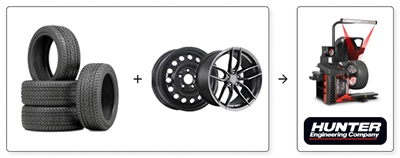Is the All-weather tire a good choice for all regions of Canada?

If you live in Quebec, you probably know that since 2008, it has been mandatory for all passenger vehicles to be equipped with tires "specifically designed for winter driving" from December 1 to March 15. However, since spring conditions can be variable, we recommend that you wait a few weeks after the end of this period before installing your all-season or summer tires—citizens who do not respect this law risk a fine of $200 to $300. Quebec is the only province to have such a law.
Since 2014, all winter tires must bear the pictogram representing a snowflake in a mountain, developed by the Canadian rubber industry in collaboration with Transport Canada. But it's not only the so-called "winter" tires that bear this famous icon; other tires also deliver it: All-Weather winter-certified 4-season tires. These tires meet the minimum standards imposed by law, but are they a good investment?
What exactly is an All-Weather tire?
While gaining in popularity over the past few years, all-season tires are not ideal for everyone. Although they are identified by the mountain and snowflake icon certifying that they have passed all the necessary safety tests, they are not specifically designed for winter use.
Their tread is stiffer than winter tires and therefore has less grip on ice. As for their tread pattern, it is less aggressive, which provides less traction in snow. Tire experts say that most All-weather tires have on average 10% more traction than a conventional summer tire. And, because their rubber is not fully adapted to warm temperatures, it wears out more quickly in the summer. All-Weather tires provide decent performance year-long but fall short in certain winter conditions.
Winter tires in good condition can:
- Reduce braking distance by 25%
- Maintain tire elasticity down to -40°C
Why choose All-Weather tires?
Generally, people who choose this type of tire avoid installing and uninstalling them when the season changes. Some prefer them because buying a set of winter tires is too big an investment. Others don't consider winter tires essential because they live in an urban area. If you live in a rural area or in a region that receives a lot of snow, we don't recommend opting for All-weather tires. No matter where you live when shopping for winter tires, the important thing is to consider your area's weather conditions, mileage, and usage.
In Quebec, winter tires are still the best option for your vehicle.
Safety first !
When it comes to winter road safety, nothing beats a good set of tires that will keep your vehicle on the road.
The winter tire requirement does not apply to:
Heavy vehicles, tool vehicles and farm machinery. For vehicle spare wheels. For seven days following the date of purchase of the vehicle from a vehicle dealer. However, you must have the contract of sale for the vehicle or a copy of it. During the seven days before the expiration of the vehicle's lease for a term of one year or more. You must have the lease agreement or a copy of the lease agreement. To vehicles for which the SAAQ issues a winter tire exemption certificate.


